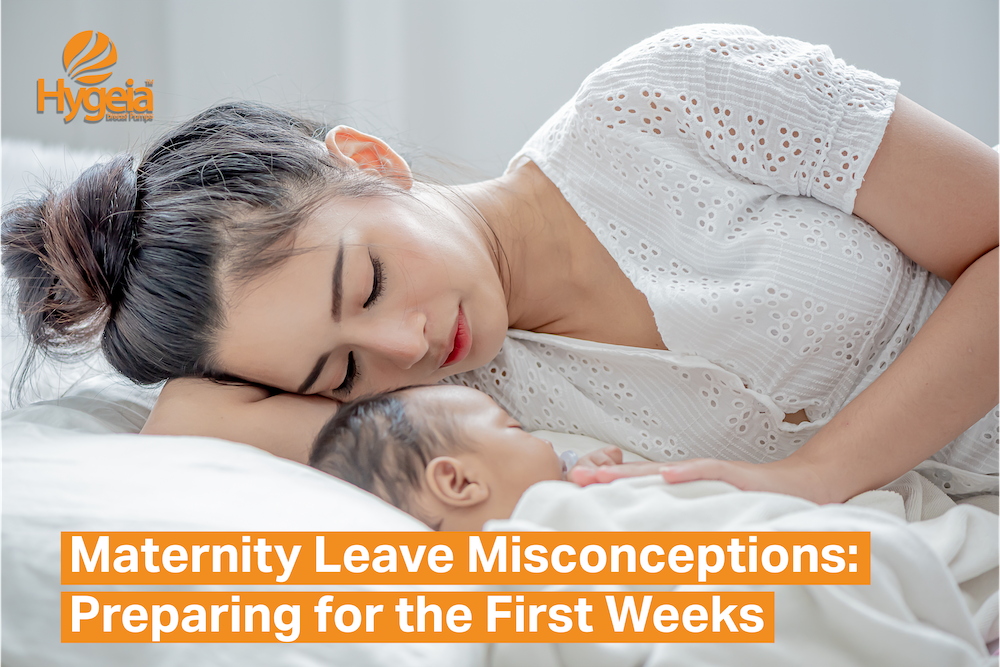Maternity leave is often talked about as this peaceful stretch of time when you bond with your baby; you get to rest, and enjoy slow days at home. The truth, if you ask any experienced mother, is usually quite different.
For many mothers, maternity leave is a mix of recovery, learning curves, emotional highs and lows, and the nonstop needs of a newborn. The gap between expectation and reality can feel huge, and that gap is exactly what leaves many women feeling unprepared.
This article takes a clear look at common misconceptions about maternity leave. Instead we hope to give the reality of what the early weeks are like and how you can prepare in practical, confidence-building ways.
Misconception 1: “Maternity leave will feel like a break.”
Reality: Maternity leave is not a vacation. Your body is healing. Your hormones are shifting. Your sleep is interrupted every few hours. Most mothers spend their days feeding, pumping, soothing, and repeating the cycle. Even moments of rest are tied to your baby’s schedule.
How to prepare:
- Build a support plan for meals, household tasks, and childcare for older children before you deliver if possible.
- Do not turn down help even if you think you “should” be able to do it all yourself.
- Create a simple feeding plan. If you plan to breastfeed or pump, know what resources are available before your baby arrives.
Misconception 2: “I’ll have plenty of time to get things done.”
Reality: Newborns often nurse eight to twelve times per day. Feeding sessions can be long, and the hours between them pass quickly. Many mothers are surprised at how little time they have for anything beyond basic needs.
How to prepare:
- Lower your expectations for productivity. Your only goals should be to recover while nurturing and feeding your baby.
- Stock up on easy, one-handed snacks and bottles of water for breastfeeding or pumping sessions.
- Create small “stations” around the house: diapers in more than one room, burp cloths within reach, and a comfortable spot to nurse or pump.
Misconception 3: “Bonding will happen instantly.”
Reality: Many mothers expect love to rush in the moment their baby arrives. While this does happen for some, bonding can also develop slowly. You are recovering physically and learning a new baby who is still figuring out how to communicate with you.
How to prepare:
- Give yourself grace if bonding takes time and know it is common with many mothers.
- Practice skin-to-skin as much as you can; even if you are not breastfeeding, letting baby sleep skin to skin helps the bond.
- Talk with your partner or support person about emotional check-ins during the first few weeks.
Misconception 4: “Breastfeeding will come naturally.”
Reality: Breastfeeding is a learned skill for both mother and baby. Sore nipples, latch challenges, and round-the-clock feedings can make the beginning feel overwhelming. Many women assume they are “doing it wrong” when the truth is that the early weeks are an adjustment period.
How to prepare:
- Meet with a lactation consultant before birth or schedule an appointment for the first week home. You can also have one visit you while you are in the hospital.
- Learn the basics of latch, feeding cues, and normal newborn behavior.
- If you plan to pump, choose a hospital-grade breast pump so you can establish and maintain supply more comfortably during this demanding season.
Misconception 5: “I’ll feel like myself again in a few weeks.”
Reality: Physical recovery can take several months. Emotional recovery can take even longer. You may feel tired, overwhelmed, or sensitive in ways you didn’t expect. None of this means you are doing anything wrong.
How to prepare:
- Have open conversations with your partner about mental health, sleep, and postpartum expectations.
- Know the signs of postpartum anxiety and depression before you need the information.
- Plan for small, practical forms of self-care, like short walks or a shower without rushing. Set these goals with your partner or a support person.
Misconception 6: “I’ll slide easily back into my old routine when maternity leave ends.”
Reality: Whether you are returning to work or continuing to stay home, your life has changed in meaningful ways. New routines take time to build. Returning to work often comes with a mix of pride, guilt, relief, and sadness. All of this is normal.
How to prepare:
- Talk with your employer early about pumping breaks, flexible schedules, and transition needs.
- Practice your pumping routine at home so it feels familiar once you return to work.
- Build a transition week into your plan. A few half-days can help you and your baby adjust gradually.
Turning Expectations Into a Realistic and Supportive Plan
Maternity leave is not a single experience. It is a major life shift filled with learning, adjusting, healing, and caring for a brand-new person. When you understand the realities instead of the picture-perfect expectations, you can prepare with more confidence and compassion for yourself.
At Hygeia Health, our focus is supporting mothers through every phase of feeding, pumping, and postpartum recovery. The right tools, along with clear information and thoughtful planning, allow mothers to navigate maternity leave with more ease.
Comfort and confidence in breastfeeding are a huge part of a positive maternity leave. Our hospital-grade breast pumps support this aspect. Apply today and Hygeia will assist in getting your high quality breast pump covered 100% by your insurance.

